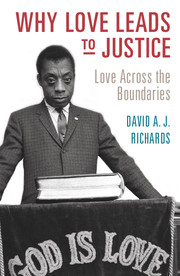Book contents
- Frontmatter
- Dedication
- Epigraph
- Content
- Acknowledgments
- Introduction: Love Resists Injustice
- 1 Breaking the Love Laws as Resistance
- 2 Benjamin Britten and Peter Pears: Love and Resistance
- 3 Christopher Isherwood's Struggle for a Resistant Voice
- 4 Wystan Auden on the Anxiety of Manhood
- 5 Bayard Rustin on Nonviolence
- 6 James Baldwin on Love and Voice
- 7 Eleanor Roosevelt, Margaret Mead, and Ruth Benedict on Resisting Patriarchy
- Conclusion: Moral Injury and Love: Why Love Leads to Justice
- Bibliography
- Index
3 - Christopher Isherwood's Struggle for a Resistant Voice
Published online by Cambridge University Press: 05 November 2015
- Frontmatter
- Dedication
- Epigraph
- Content
- Acknowledgments
- Introduction: Love Resists Injustice
- 1 Breaking the Love Laws as Resistance
- 2 Benjamin Britten and Peter Pears: Love and Resistance
- 3 Christopher Isherwood's Struggle for a Resistant Voice
- 4 Wystan Auden on the Anxiety of Manhood
- 5 Bayard Rustin on Nonviolence
- 6 James Baldwin on Love and Voice
- 7 Eleanor Roosevelt, Margaret Mead, and Ruth Benedict on Resisting Patriarchy
- Conclusion: Moral Injury and Love: Why Love Leads to Justice
- Bibliography
- Index
Summary
Christopher Isherwood came from a wealthier and more privileged background than Britten and Auden, his ancestors including the judge who ordered the execution of Charles I. The great struggle of both his life and work was defined both by his homosexuality and by his deep skepticism about the ideal of the war hero that had led Britain, disastrously, into World War I. What made this struggle so personal for him was that his father, a professional officer in the military, was killed in World War I when Christopher was eleven, and then was passionately idealized by his mother and set up as a model for her two sons. But Christopher, the older son, had known his father, and thus knew a truth about the man behind his mother's myth making.
His father was not a conventional military professional. Before attending military college at Sandhurst, he had had a broad liberal arts education; “he had been to school at Cheltenham College and university at Clare College, Cambridge.… He was widely read, played the piano well, composed songs, and was keenly interested in art and architecture.” Even more fascinating, “Frank often played female roles in amateur theatricals, his luxuriant moustache presumably adding to the comedy of the proceedings.” The relationship between father and son was affectionate, and the father, in a letter to his wife from the front of World War I, expressed an interest in the liberal education of his son that would nurture his individuality:
The whole point of sending him to school was to flatten him out, so to speak, and make him like the other boys, and when all is said and done I don't know that this is at all desirable or necessary, and I for one would much rather have him as he is.
This was not, however, to be the attitude of Isherwood's mother, Kathleen, after her husband's death. Kathleen was the independent-minded child of difficult parents, and she had an interest in excursions that prefigured her son's travels, co-authoring a book, Our Rambles in Old London, that had been published to polite reviews in 1895.
- Type
- Chapter
- Information
- Why Love Leads to JusticeLove across the Boundaries, pp. 73 - 94Publisher: Cambridge University PressPrint publication year: 2015

